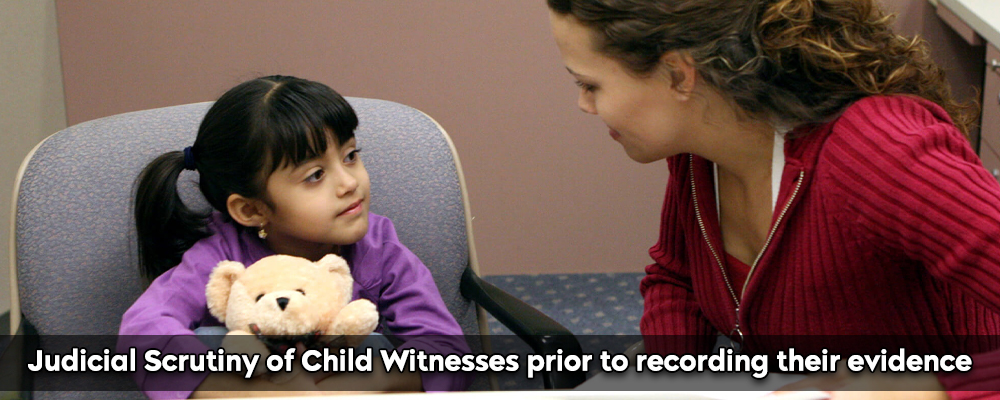Children often face various challenges when appearing as witnesses in court. Their age, limited understanding of legal processes and susceptibility to coercion or undue influence make it imperative for trial courts to take precautions to protect their rights. Proper preliminary examination serves as a vital safeguard, enabling courts to assess the child’s competency, understanding, and ability to provide accurate and reliable testimony.
By ensuring that child witnesses are capable of comprehending the significance of truth-telling and the consequences of their statements, the court upholds their right to fair participation in legal proceedings.
Need A Legal Advice
The internet is not a lawyer and neither are you. Talk to a real lawyer about your legal issue

Identifying Vulnerabilities and Providing Support
Children may experience various vulnerabilities that can impact their ability to testify effectively. They might face fear, trauma, or intimidation, which can hinder their willingness to disclose crucial information. The preliminary examination enables trial courts to identify and address these vulnerabilities, ensuring that child witnesses feel safe, supported, and empowered during the legal process.
By creating a conducive environment and offering appropriate assistance, such as providing emotional support or allowing the presence of a trusted adult, the court can mitigate the potential negative effects of testifying for children.
Precautions for Safeguarding the Child Witnesses
Safeguarding child witnesses requires the implementation of several essential precautions to protect their well-being and ensure the accuracy of their testimonies. The precautions are as follows-
Specialized Interviewing Techniques
Trained professionals should use child-friendly and non-leading interviewing techniques when questioning child witnesses. These techniques minimize the risk of coercion or suggestion, ensuring that the child’s testimony is accurate and untainted.
Supportive Environment
Creating a safe and supportive environment is crucial for child witnesses. The interview setting should be comfortable and child-friendly, allowing the child to feel at ease and more likely to share their experiences. The presence of a trusted adult, such as a family member or support person, can provide reassurance and emotional support during the process.
Age-Appropriate Communication
Effective communication with child witnesses involves using language that is suitable for their age and development. Professionals involved in the legal process should adapt their vocabulary and communication style to match the child’s understanding. This ensures that questions and instructions are clear and comprehensible to the child.
Avoiding Leading Questions
Leading questions can inadvertently influence a child’s testimony. Interviewers and legal professionals should avoid asking leading questions that suggest a particular response. Open-ended questions that encourage the child to provide their own narrative should be used instead, allowing for unbiased and accurate information.
Psychological Support
Child witnesses may experience emotional distress or trauma due to their involvement in legal proceedings. It is essential to provide access to psychological support services, such as counseling or therapy, to help the child cope with any emotional challenges that may arise. This support promotes their well-being and helps mitigate any negative impact on their mental health.
Privacy and Confidentiality
Protecting the privacy and confidentiality of child witnesses is critical. Their identities and testimonies should be kept confidential to prevent potential harm or retaliation. Strict measures should be in place to ensure that the child’s information remains secure and that unauthorized individuals do not have access to it.
Training for Legal Professionals
Judges, lawyers, and court personnel should receive specialized training on child development, trauma-informed practices, and interviewing techniques. This training equips them with the necessary knowledge and skills to handle child witnesses sensitively and effectively, ensuring their rights and well-being are upheld.
Role of Judiciary: Supreme Court
In the case of Pradeep v State of Haryana, the Supreme Court emphasizes the critical role of trial courts in conducting proper preliminary examinations of child witnesses before recording their evidence. By prioritizing the protection of their rights, the preservation of justice, and the establishment of a fair judicial process, trial courts contribute to the integrity and credibility of the legal system.
Through comprehensive assessments of competence, understanding, and vulnerabilities, courts can ensure the accuracy and reliability of child witness testimonies.
Conclusion
Therefore, proper preliminary examinations of child witnesses establish procedural fairness by providing equal opportunities for all parties and ensuring reliable evidence. Recognizing the unique vulnerabilities of child witnesses demonstrates a commitment to fairness and impartiality. This commitment enhances the credibility of the judicial system and fosters public trust in its ability to deliver justice through a transparent and equitable process.
One can talk to a lawyer at Lead India for any kind of legal advice. In India, free legal advice online is available by Lead India. Along with getting free legal advice online, you can ask questions to experts online free at Lead India.





 Talk to a Lawyer
Talk to a Lawyer